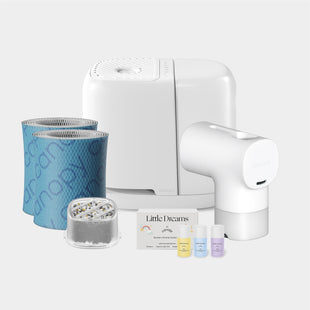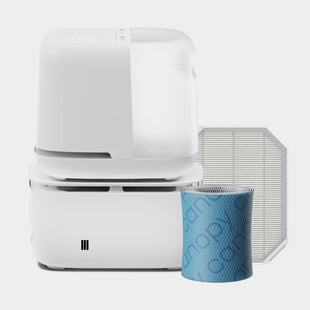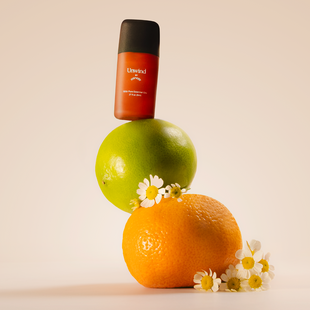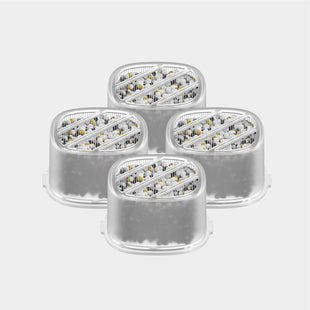As our largest organ, the skin is in constant contact with the environment. So, everything from extreme temperatures to air pollutants has a massive impact on it. That's why our skin requires meticulous care. Here, we gathered fundamental tips for healthy skin that will help you to develop a skincare routine for every season.
5 Winter Skincare Tips
Use Cream Moisturizers
The combination of cold weather and the indoor heaters dehydrates the skin, so a moisturizer is one of the most crucial winter skincare tips. Moisturizers alleviate dehydration by attracting water from the air into the epidermis and slowing evaporation from the surface [1]. Because harsh winter months mean drier skin, you should use a cream moisturizer rather than a lotion, as the higher oil concentration creates an extra-protective barrier.
Lukewarm Water
Cold winter months might make you tempted to take long and steamy showers, but you should resist this urge. When hot water contacts your skin, it damages the keratin cells on the outer layer and removes their natural moisturizing factor (NMF) content, disrupting the protective barrier that traps moisture. The result is dry skin vulnerable to cracks and eczema. An alternative skincare tip for winter is to opt for lukewarm water, around 85 to 95oF. That way, you can cleanse your skin without damaging the epidermis.

Exfoliate Gently
Your skin cells are prone to dying because of excessive dehydration in winter, so you need to strip them away to make room for new cells to develop and absorb moisture. That said, you should go easy on exfoliation to protect the integrity of the skin barrier, especially if your skin is sensitive. Gentle exfoliators for winter include jojoba beads that remove dead skin through rubbing and lactic acid that chemically breaks apart dead skin cells.
Healthy Fats
Your diet has a significant role in retaining the skin moisture levels, and healthy fats are essential components of that diet. Research suggests that foods that contain omega 3 fatty acids can promote collagen production and prevent skin cancer [2]. Another natural remedy amongst winter skincare tips is avocado. Packed with antioxidants and vitamins E-C, avocado prevents collagen and lipid breakdown, keeping the skin hydrated and repairing existing skin damage [3].
Humidifier
Besides your skincare routine and diet, your surroundings can affect the skin drastically. Indoor heaters cause a drop in the moisture levels, so you need a humidifier to counteract that. By releasing humidity into the air, a humidifier can raise the moisture level and provide your skin with the hydration it needs.

5 Summer Skincare Tips
Use Lotion Moisturizers
Moisturizing is a year-round skincare routine, but the most suitable moisturizer type depends on the weather. The winter creams, which form a protective barrier and prevent water from escaping, can leave your skin yearning for breath. In turn, your pores can get clogged, leading to blackheads and acne. That's why you should opt for lotions with a higher water-to-oil ratio to maintain optimum moisture while allowing your pores to breathe.

Exfoliate For Clean Pores
Because your sebaceous glands are more active in summer, your skin produces more oil that can trap bacteria and cause congestion in your pores. You can tackle this by using an exfoliator -with caution. When overused, chemical exfoliators containing glycolic acid can damage the skin barrier and expose it to sunlight. So, you should use them at night time if possible.
USE Sunscreen
Using sunscreen is a must to protect the skin against sunlight, but more so during summer. The UVA and UVB rays were found to generate free radicals in the body, causing inflammation, early aging, and skin cancer. A broad-spectrum sunscreen with an SPF of 50 or higher can absorb or reflect both UV lights (depending on its formulation) with 97-98% efficiency. So, don't forget to apply sunscreen regularly throughout the day.
Antioxidants
Increasing the antioxidants in your diet can help your body combat the free radicals caused by UV exposure. By binding to these free radicals, antioxidants prevent them from damaging the skin cell DNA. For example, scientists found the scavenging effects of lycopene in tomato against sunburn-related blisters and swelling [4]. Besides tomato, there is a plethora of food containing antioxidants, including citrus, green vegetables, green tea, whole grains, and nuts.
Blue Light Therapy
One extra nudge to combat acne in summer is blue light therapy. Studies showed that the wavelength of blue light boasts antimicrobial properties and can kill bacteria accumulating in pores [5]. In clinic trials, applying this therapy for five weeks resulted in a 77% acne reduction in participants [6]. Today, blue light therapy is FDA-approved and can be applied by a dermatologist.
How to Develop a Skincare Routine
Regardless of the time of the year, a healthy skincare routine comprises a few essential components. Here are the main steps for developing a skincare routine.
Cleansing
First and foremost, you need to remove the airborne pollutants, dirt, and bacteria from your skin. This step involves the usage of cleansers and exfoliators to wipe away impurities.

Toning
Toners are, quite frankly, supplements for skincare. Boasting a combination of hydroxy acids, vitamins, peptides, and ceramides, toners can tackle any skin damage from moisture loss and inflammation to aging and dark spots.
Moisturizing
Finally, you should apply a moisturizer to prevent water loss through the epidermis. The right type of moisturizer will vary depending on your skin type and the climate in your area.
SPF
A morning skincare routine cannot be complete without sunscreen application, especially if you are going out during the day.
Conclusion
Establishing a healthy skin care routine can be intricate and overwhelming. However, if you know the essential steps for every season and the best ingredients for your skin type, your skin quality will improve significantly.
[1] Purnamawati, Schandra et al. “The Role of Moisturizers in Addressing Various Kinds of Dermatitis: A Review.” Clinical medicine & research vol. 15,3-4 (2017): 75-87. doi:10.3121/cmr.2017.1363
[2] Pilkington, Suzanne Margaret, and Lesley Elizabeth Rhodes. "Omega-3 fatty acids and skin." Nutrition for Healthy Skin. Springer, Berlin, Heidelberg, 2010. 91-107.
[3] Werman, M. J., et al. "The effect of various avocado oils on skin collagen metabolism." Connective tissue research 26.1-2 (1991): 1-10.
[4] Rizwan, M., et al. "Tomato paste rich in lycopene protects against cutaneous photodamage in humans in vivo: a randomized controlled trial." British Journal of Dermatology 164.1 (2011): 154-162.
[5] Gold, Michael H et al. “Clinical Efficacy of Self-applied Blue Light Therapy for Mild-to-Moderate Facial Acne.” The Journal of clinical and aesthetic dermatology vol. 2,3 (2009): 44-50.
[6] Dai, Tianhong et al. “Blue light for infectious diseases: Propionibacterium acnes, Helicobacter pylori, and beyond?.” Drug resistance updates : reviews and commentaries in antimicrobial and anticancer chemotherapy vol. 15,4 (2012): 223-36. doi:10.1016/j.drup.2012.07.001






























